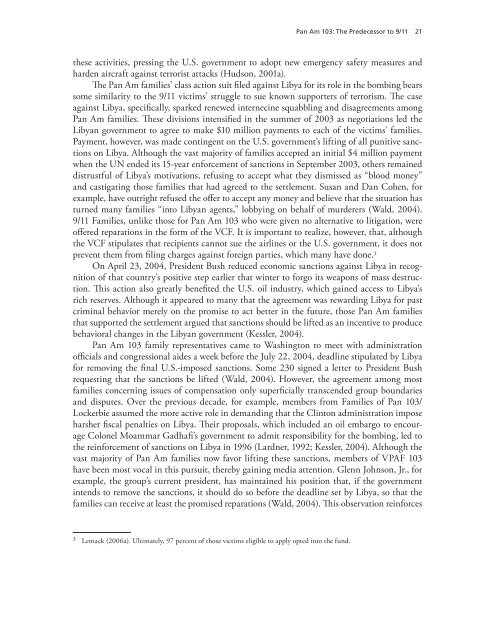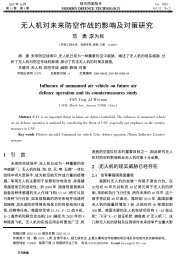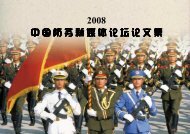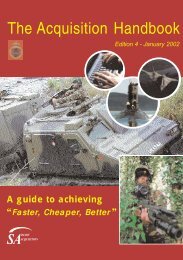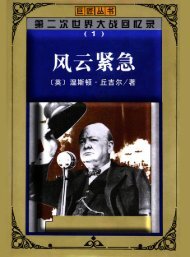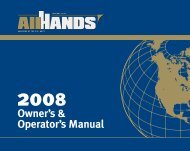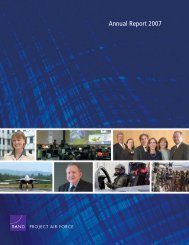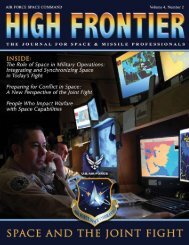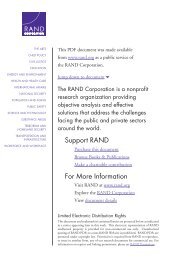The Victims of Terrorism: An Assessment of Their Influence and ...
The Victims of Terrorism: An Assessment of Their Influence and ...
The Victims of Terrorism: An Assessment of Their Influence and ...
Create successful ePaper yourself
Turn your PDF publications into a flip-book with our unique Google optimized e-Paper software.
Pan Am 103: <strong>The</strong> Predecessor to 9/11 21these activities, pressing the U.S. government to adopt new emergency safety measures <strong>and</strong>harden aircraft against terrorist attacks (Hudson, 2001a).<strong>The</strong> Pan Am families’ class action suit filed against Libya for its role in the bombing bearssome similarity to the 9/11 victims’ struggle to sue known supporters <strong>of</strong> terrorism. <strong>The</strong> caseagainst Libya, specifically, sparked renewed internecine squabbling <strong>and</strong> disagreements amongPan Am families. <strong>The</strong>se divisions intensified in the summer <strong>of</strong> 2003 as negotiations led theLibyan government to agree to make $10 million payments to each <strong>of</strong> the victims’ families.Payment, however, was made contingent on the U.S. government’s lifting <strong>of</strong> all punitive sanctionson Libya. Although the vast majority <strong>of</strong> families accepted an initial $4 million paymentwhen the UN ended its 15-year enforcement <strong>of</strong> sanctions in September 2003, others remaineddistrustful <strong>of</strong> Libya’s motivations, refusing to accept what they dismissed as “blood money”<strong>and</strong> castigating those families that had agreed to the settlement. Susan <strong>and</strong> Dan Cohen, forexample, have outright refused the <strong>of</strong>fer to accept any money <strong>and</strong> believe that the situation hasturned many families “into Libyan agents,” lobbying on behalf <strong>of</strong> murderers (Wald, 2004).9/11 Families, unlike those for Pan Am 103 who were given no alternative to litigation, were<strong>of</strong>fered reparations in the form <strong>of</strong> the VCF. It is important to realize, however, that, althoughthe VCF stipulates that recipients cannot sue the airlines or the U.S. government, it does notprevent them from filing charges against foreign parties, which many have done. 3On April 23, 2004, President Bush reduced economic sanctions against Libya in recognition<strong>of</strong> that country’s positive step earlier that winter to forgo its weapons <strong>of</strong> mass destruction.This action also greatly benefited the U.S. oil industry, which gained access to Libya’srich reserves. Although it appeared to many that the agreement was rewarding Libya for pastcriminal behavior merely on the promise to act better in the future, those Pan Am familiesthat supported the settlement argued that sanctions should be lifted as an incentive to producebehavioral changes in the Libyan government (Kessler, 2004).Pan Am 103 family representatives came to Washington to meet with administration<strong>of</strong>ficials <strong>and</strong> congressional aides a week before the July 22, 2004, deadline stipulated by Libyafor removing the final U.S.-imposed sanctions. Some 230 signed a letter to President Bushrequesting that the sanctions be lifted (Wald, 2004). However, the agreement among mostfamilies concerning issues <strong>of</strong> compensation only superficially transcended group boundaries<strong>and</strong> disputes. Over the previous decade, for example, members from Families <strong>of</strong> Pan 103/Lockerbie assumed the more active role in dem<strong>and</strong>ing that the Clinton administration imposeharsher fiscal penalties on Libya. <strong>The</strong>ir proposals, which included an oil embargo to encourageColonel Moammar Gadhafi’s government to admit responsibility for the bombing, led tothe reinforcement <strong>of</strong> sanctions on Libya in 1996 (Lardner, 1992; Kessler, 2004). Although thevast majority <strong>of</strong> Pan Am families now favor lifting these sanctions, members <strong>of</strong> VPAF 103have been most vocal in this pursuit, thereby gaining media attention. Glenn Johnson, Jr., forexample, the group’s current president, has maintained his position that, if the governmentintends to remove the sanctions, it should do so before the deadline set by Libya, so that thefamilies can receive at least the promised reparations (Wald, 2004). This observation reinforces3 Lemack (2006a). Ultimately, 97 percent <strong>of</strong> those victims eligible to apply opted into the fund.


